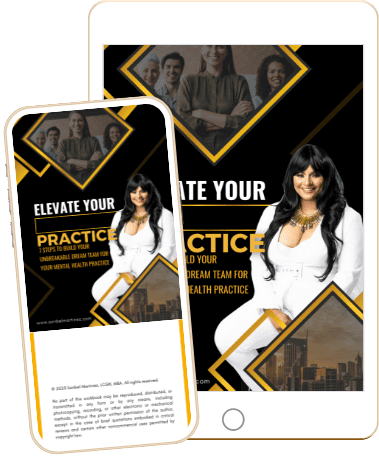Personal Development for Mental Health Group Practice Owners
Being a business owner is not all about business. Reaching your full potential in your professional development will largely depend on your personal growth. A personal development plan is a must if you are going to be the best version of yourself as a business owner. So, what is personal development? It is the ongoing process of improvement through acquiring new knowledge, skills, and insights. It is taking action that leads to positive changes in your life.
This has obvious implications for your business. In a rapidly changing world, wise business owners will continually develop new knowledge, skills, and insights. Having the courage to make positive changes will pay off personally and professionally. Therefore, in this blog, we will explore a plan for personal development that involves the following:
- The importance of personal development
- Self-assessment
- Goal setting
- Clarifying your goals
- Developing a support system
- Celebrating your journey
- Helpful next steps on your personal development journey
The Importance of Personal Development in Your Group Therapy Practice
In the midst of a busy workday, it’s easy to get caught up in the tasks at hand and overlook personal development. However, recognizing its importance is the first step toward achieving long-term success.
While completing daily tasks is important, adapting your health, relationships, and business skills to new challenges is critical. This is where personal development comes into play, as it is essential for personal and professional growth.
Investing in personal development not only allows you to adapt to challenges, but it also leads to greater fulfillment and purpose in life. By identifying and pursuing your passions and goals, improving your self-esteem and confidence, and finding meaning and purpose, you can live a more fulfilling and successful life.
Self-Assessment Leads to Self Care for Group Practice Owners
Personal development begins with self-assessment, and this requires self-awareness. Your personal development journey can only begin where you are right now. A time of honest self-reflection will be necessary to assess your current state. This is a time that a SWOT analysis can be helpful.
This is not a time to compare yourself to other people. Family, friends, and co-workers are not part of this stage of the process. Everybody’s personal life and career development is different. Everyone has different opportunities and resources, with a different path to success.
Comparisons lead to judgments, and judgments tend to create a negative story. Thoughts such as “I’m not good enough” or “I’m not worthy” poorly affect self-esteem and make self-assessment all the more difficult.

By putting aside the comparisons, you can start your personal development plan by taking time to learn about yourself. Identify where you are now, and explore potential growth areas in your life. Assess all areas of your life, including the following:
- Family
- Career
- Friends
- Finances
- Physical health
- Quality of life
- Overall well-being
- Work-life balance
- Mental health
Then, evaluate how you got where you are.
- What action or inaction helped you become who you are today?
- How satisfied are you with the current shape of your life in each area on a scale of 1-10?
Then, imagine where you want to be.
- Where do you want your business to be?
- Your relationships?
- Your family life?
- How will you feel once you have the life you want?
- How will your thought patterns change?
All these questions lead naturally to setting goals.
Goal Setting
The areas where you are not satisfied are areas of personal development. For each area of dissatisfaction, identify one thing you can do to move to the next level. These are your personal development goals.
It’s important to know that you don’t have to attack every area at once. Pick one or two categories where you are most dissatisfied and create self-improvement goals around those areas.
For example, Suppose you rated finances as the lowest level of satisfaction. In that case, you might set a goal to earn an additional $10,000 this year. If your lowest satisfaction concerns self-care, your goal might be to include a ten-minute walk once a day or to schedule one fun evening out per month.
Goal Setting for Group Therapy Practice Owners
When you set goals personally or professionally, make sure they are realistic and achievable. Yet, don’t make them so easy that you don’t have to change anything about your life to reach them. Set goals that stretch, scare, and excite. You want to expand your capacity to create. The dream is to change, grow, and create your level-10 life.
Clarifying your goals requires the following:
- Develop action steps
- Set a timeline for the completion of each step
- Develop a list of the resources you’ll need
You may need to read about time management. You may need to learn to disconnect from electronics and be present with your children when you’re home. Whatever it is, be clear and specific about what you want to achieve.
Develop a Support System
You have assessed your areas for improvement, set your goals, and have them clarified in your mind. Now it is time to get to work on your self-development goals. Now you need a cohesive system around you to support and help in your learning process.
Seek help from a therapist, a life coach, self-development books, online learning, and conversations with people who are living a life similar to the one you want. Problem-solving isn’t about having all the answers. It is about the journey of finding them.
One of the best steps you can take is to hire a coach.
Hiring coaches: I always hire the people I need to learn new skills. Right now, I’m working on developing my spacing ability to become an expert-level public speaker. So, I hired a public speaking coach who is helping me develop my topics, structure speaking events, and refine my communication skills.
In addition to hiring a speaking coach, I have also benefited from the following:
Whatever area I identify as a growth area, I will seek new learning and an expert to help. A coach helps keep you in that growth mindset and push past your comfort zone, developing the self-confidence to attain your dreams.
Last summer, I texted my writing coach, “Do you think I’m a good enough writer to write a book?”
She responded, “I think you have an amazing story and the expertise to turn your story into a book people need.”
I wrote that book – the one I had dreamed about since I was seven. Unbreakable hit #1 and #2 in a few different categories on Amazon.
The elements we are exploring here are not only about your career path. It is a lifelong process of learning. So, in addition to hiring coaches, there are some positive personal habits to develop as you expand your self-improvement system. This can include the following:
- Reading for self-development. Read every day. I don’t typically read a whole book – one of my mentors told me to do this: Go to the table of contents and look for parts and chapters you need. Read those chapters. It’s not necessary to sit and read a whole book. Read for knowledge, understanding, and development.
- Personal development courses. These can be online or in-person.
- Networking. Find events, conferences, seminars, coaching programs, and consulting programs. These are great places to meet and learn from other professionals.
As you develop your support system, your personal development skills will be enhanced. You won’t have to do it alone. You will have a cohesive system around you that will make the learning process natural and even enjoyable.
Celebrate Your Journey

Milestones are important. Celebrate each one. Celebrate each time you reach a goal and clear that benchmark of self-improvement.
Celebrating these milestones can boost self-confidence, provide motivation to continue the journey, and inspire others to embark on their own personal development journeys.
They can be celebrated in various ways, such as treating yourself to something special, sharing the accomplishment with friends and family, or hosting a small gathering. Celebrating personal development milestones is a powerful way to acknowledge and appreciate your journey toward becoming the best version of yourself.








